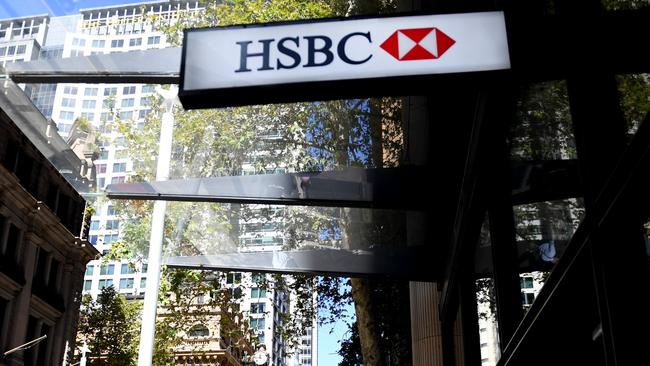Scam victims score a win but what does it mean and will it be upheld in future cases?
Consumers scored a win against big banks with a recent ruling opening the door for scam victims to be compensated, but will the precedent last?

Business
Don't miss out on the headlines from Business. Followed categories will be added to My News.
In the war on scams, banks have been fighting on two fronts: against the scammers and, all too often, against the victims themselves.
But finally consumers have had a win and it could change everything.
Global banking giant HSBC recently found itself on the wrong side of a lead decision by the financial complaints ombudsman over who should wear the cost of an SMS scam that robbed a customer of more than $47,000.
HSBC’s argument – and it is one that other banks also rely on – was that the victim was at fault for “voluntarily” handing over passcodes to a scammer impersonating the bank.
Perhaps not surprisingly, given reports HSBC customers lost $6.3m in the eight months to March as a result of the “spoofing” or impersonation scam, the bank took an adversarial approach to the victim’s claim, saying he voluntarily handed over his passcodes to the scammer.
The Australian Financial Complaints Authority took a different view, siding with the victim in finding he did not voluntarily disclose passcodes to the scammer.
“The panel is satisfied the scammer’s manipulative tactics resulted in a degree of coercion that impacted the complainant’s free will and choice, so the complainant felt compelled to disclose the passcodes,” AFCA said.

“The panel is satisfied the scammer created a sense the complainant needed to act urgently to prevent the loss of his funds, and the overall impression he was dealing with the bank, and it would therefore not be fair in all the circumstances to find the disclosure of the passcodes was voluntary.”
HSBC was ordered to pay a little over $47,000 to the victim, as well as $5000 toward legal costs.
The landmark ruling will send shivers down the spines of bank CEOs, as it opens the door for victims of similar scams to be compensated by their lender.
Up until now just 2-5 per cent of scam losses were reimbursed by the banks, according to the Consumer Action Law Centre.
What’s more, there are already expectations of further findings against HSBC in similar cases in the coming months.
In making the determination in favour of the complainant, the AFCA panel had considered not only the scam itself, but also how the bank had treated the customer and that the legal test set out in the lead decision would apply “for other very similar cases”, AFCA deputy chief ombudsman Dr June Smith told The Weekend Australian.
There are takeaways for other banks as scams get more sophisticated, she said.
“Community expectations of how (banks) are identifying, preventing and detecting scams is changing, and consumers expect that if they are required to engage in digital payment systems, then banks (are expected) to keep that money safe,” Smith said.
“Instead of engaging in an adversarial position with an external dispute resolution scheme, which is, after all, a very informal process, … we’re just saying to the banks, focus on making sure that when people engage with your digital payment systems, they’re safe and their money is safe.”
Banks have in the past year put in place measures and protections to stop scammers, adding friction to payments and limiting transfers to high-risk crypto exchanges.
And not a moment too soon. More than 600,000 Australians lost $2.74bn to scammers last year through bogus investments, romances and remote-access scams, among others.
Scam complaints to AFCA, meanwhile, surged in the 12 months to the end of June, to just under 11,000, which was up a staggering 81 per cent on the previous year.
The federal government is also doing its part. Since being elected, Labor has set up the National Anti-Scam Centre and this week introduced legislation to federal parliament to establish its “scams prevention framework”. Banks, social media platforms and telecommunications companies face hefty fines if they do not take reasonable steps to prevent, detect, and report scams in their businesses.
Banks are, unsurprisingly, keen for telcos and social media platforms to take more responsibility in the war against scammers.
“This new framework will address the core problem of people being exposed to scams in the first place. That means ensuring telcos and the social media platforms have strong protections in place to stop scams reaching Australians,” Australian Banking Association chief executive Anna Bligh says.
But crucially, the government has stopped short of requiring banks to compensate customers who suffer scam losses unless they breach the new code; keep in mind here that they will have to show they took “reasonable steps”, but it’s not clear what is and isn’t “reasonable”.
This means the new laws could actually work against AFCA’s landmark scam decision, CALC chief executive Stephanie Tonkin said.
“There were some pretty outstanding elements (with the HSBC case), that the bank missed, and the telcos allowed those text messages to come through (to customers) in the same thread as official HSBC text messages. So there could be the argument that through other means, the consumer would be reimbursed,” Tonkin said.
“But it may be the case that, under the new laws, the bank can show that it met the minimum standards. So even though the scam was allowed through, the bank can say ‘it’s not our fault’, and it’s then the customer who has to bear the losses.”
The government is missing an opportunity for Australia to be world leading in fighting scammers, she said.
“If we’re not world leading, that means we are the honey pot for scammers. The way the scams code framework is drafted, consumers bear the burden of the system and the scam losses,” Tonkin said.
“When, really, with the sophistication that we’re talking about now, the only ones with information, resources and the ability to stop scams, are businesses.”
Originally published as Scam victims score a win but what does it mean and will it be upheld in future cases?





